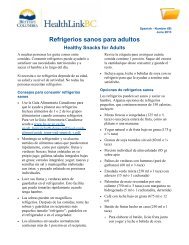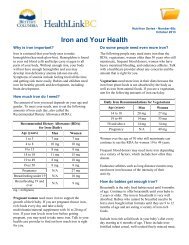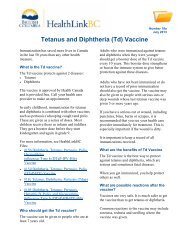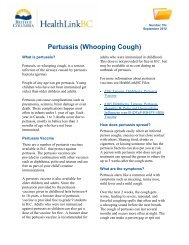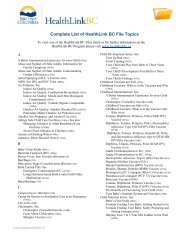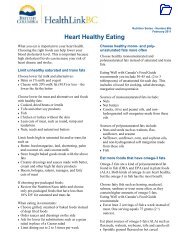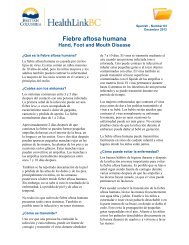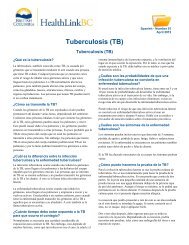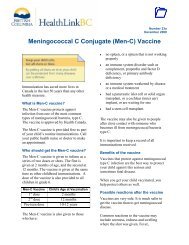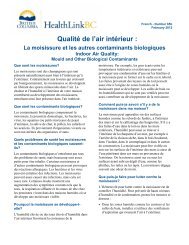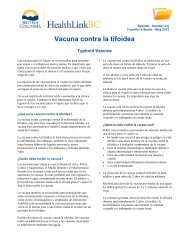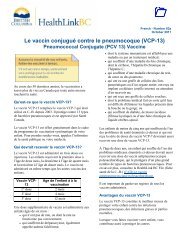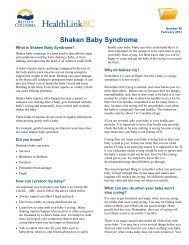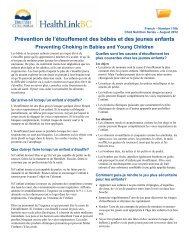Facts About Chickenpox - HealthlinkBC File #44a - Printer-friendly ...
Facts About Chickenpox - HealthlinkBC File #44a - Printer-friendly ...
Facts About Chickenpox - HealthlinkBC File #44a - Printer-friendly ...
Create successful ePaper yourself
Turn your PDF publications into a flip-book with our unique Google optimized e-Paper software.
<strong>Facts</strong> about <strong>Chickenpox</strong><br />
Number 44a<br />
November 2012<br />
What is chickenpox?<br />
<strong>Chickenpox</strong> is an infection caused by the<br />
varicella-zoster virus. <strong>Chickenpox</strong> is usually<br />
a mild illness in children. Infection in<br />
teenagers, adults and people with weakened<br />
immune systems can be more serious.<br />
Complications from chickenpox include<br />
pneumonia (lung infection), encephalitis<br />
(swelling of the brain), and bacterial<br />
infections of the skin from scratching.<br />
Encephalitis can lead to convulsions,<br />
deafness, or brain damage. <strong>About</strong> 1 in every<br />
3,000 adults with chickenpox will die from<br />
the infection. <strong>Chickenpox</strong> can cause birth<br />
defects if the mother gets chickenpox while<br />
she is pregnant, and these can be fatal.<br />
Is there a vaccine?<br />
Yes, the chickenpox vaccine provides<br />
protection against chickenpox. For more<br />
information, see HealthLinkBC <strong>File</strong> #44b<br />
<strong>Chickenpox</strong> (Varicella) Vaccine.<br />
How is chickenpox spread?<br />
The virus is spread through the air by an<br />
infected person sneezing or coughing. It can<br />
also be spread through contact with the fluid<br />
from chickenpox blisters, or the saliva of a<br />
person who has chickenpox. A pregnant<br />
woman with chickenpox can pass it to her<br />
baby before birth.<br />
People with chickenpox can spread the virus<br />
to others from up to 5 days before and 5<br />
days after the rash appears. They are most<br />
contagious from the day before and for the<br />
first few days after the rash appears.<br />
To reduce the spread of chickenpox,<br />
children with the illness should not attend<br />
daycare or school until 5 days after the rash<br />
first appears or the blisters have crusted.<br />
It usually takes 2 to 3 weeks for a person to<br />
get sick after exposure to the virus. If your<br />
child is exposed to chickenpox, watch for<br />
signs of the illness for the next 2 to 3 weeks.<br />
What are the symptoms?<br />
Symptoms of chickenpox may include fever,<br />
aches, tiredness, headache and loss of<br />
appetite. A few days later, a rash appears.<br />
Red spots appear first on the face and scalp,<br />
and then spread quickly down the body and<br />
to the arms and legs. The spots become very<br />
itchy and begin to look like blisters, filled<br />
with clear fluid. After another few days, the<br />
fluid becomes cloudy, the blisters break, and<br />
a crust or scab forms while the skin heals.<br />
During this time, new "crops" of spots<br />
appear, form blisters, and then crust over.<br />
<strong>Chickenpox</strong> usually lasts about 10 days.<br />
What is the treatment?<br />
If you have been exposed to the chickenpox<br />
virus, your treatment will depend on your<br />
age, personal health, and severity of the<br />
illness. Most healthy children will only need<br />
to stay at home and rest.<br />
Pregnant women, newborn infants, and<br />
people with weakened immune systems who<br />
have not been vaccinated or have not had<br />
chickenpox or shingles in the past should<br />
see a health care provider immediately if<br />
they are exposed to, or get, chickenpox.<br />
Prevention methods must be started as soon<br />
as possible to reduce the illness, and the risk<br />
for complications.
Prevention methods may include antiviral<br />
medication, an injection of varicella zoster<br />
immune globulin or the varicella vaccine.<br />
What is the home treatment?<br />
In most cases, chickenpox is a mild illness.<br />
If you have chickenpox, you should rest but<br />
you do not need to stay in bed.<br />
The most helpful things you can do are those<br />
that make you or your child feel more<br />
comfortable. Some steps you can take are to:<br />
Drink lots of liquids such as water, juice<br />
and soup, especially if there is a fever. If<br />
your baby is breastfeeding, feed your<br />
baby more often.<br />
Keep fingernails short and clean, and<br />
cover hands with gloves or socks at night<br />
to prevent scratching.<br />
Keep the skin cool to relieve itching.<br />
Dress lightly and avoid hot baths and<br />
showers. Ask your pharmacist or health<br />
care provider about lotions that can<br />
reduce the itching.<br />
Prevent the spread of infection by using a<br />
household cleaner to wash any clothing<br />
or other items soiled with fluid from<br />
chickenpox blisters. Keep the infected<br />
person away from other family members<br />
who have not had chickenpox.<br />
Acetaminophen or Tylenol ® can be given for<br />
fever or soreness. ASA or Aspirin ® should<br />
NOT be given to anyone under 20 years of<br />
age due to the risk of Reye Syndrome.<br />
For more information on Reye Syndrome,<br />
see HealthLinkBC <strong>File</strong> #84 Reye Syndrome.<br />
again later in life and cause a painful rash<br />
with blisters called shingles.<br />
Symptoms of shingles include headache,<br />
fever, nausea and chills. People may feel<br />
itching, tingling, or extreme pain in the area<br />
where a rash develops several days later. It<br />
takes 2 to 4 weeks for the blisters to heal,<br />
although some scars may remain.<br />
A person with shingles who feels well does<br />
not need to stay away from work or other<br />
activities, as long as the rash can be<br />
completely covered. Shingles can not be<br />
passed from person to person. However, a<br />
person who has not had chickenpox or the<br />
chickenpox vaccine can get chickenpox<br />
from someone with shingles. This is<br />
uncommon and requires direct contact with<br />
the fluid from the shingles blisters.<br />
For more information about shingles, see<br />
HealthLinkBC <strong>File</strong> #111 Shingles Vaccine.<br />
For more HealthLinkBC <strong>File</strong> topics, visit<br />
www.HealthLinkBC.ca/healthfiles or your<br />
local public health unit.<br />
Click on www.HealthLinkBC.ca or call 8-1-1<br />
for non-emergency health information<br />
and services in B.C.<br />
For deaf and hearing-impaired assistance,<br />
call 7-1-1 in B.C.<br />
Translation services are available in more<br />
than 130 languages on request.<br />
What is shingles?<br />
The same virus that causes chickenpox<br />
causes shingles. For some people who have<br />
had chickenpox, the virus can become active



